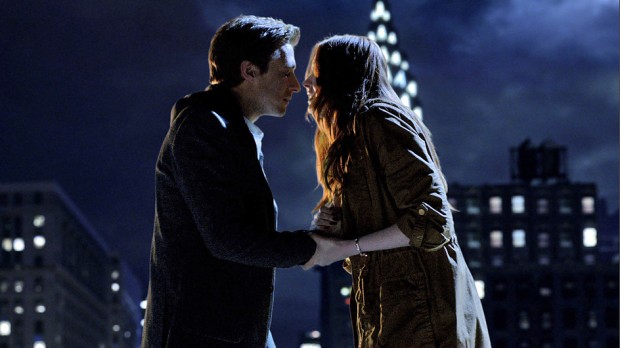‘Changing The Future; It’s Called Marriage,’ Part 1
After that last Doctor Who episode, this year’s midseason finale, I think several people owe apologies to executive Steven Moffat. I mean this for naysayers, slackers, heterophobes, and folks (like Joss Whedon) who seem to think stable relationships make for dull stories.
 In “The Angels Take Manhattan,” we learned that the Doctor, the thousand-year-old time-traveling Time Lord, hates endings. When he reads novels, he tears out the final page so he can never know for sure what happened. (Presumably the Ninth Doctor missed the very end of The Lovely Bones, and the Tenth Doctor only missed part of the epilogue of Harry Potter and the Deathly Hallows; he told Martha Jones that made him cry.)
In “The Angels Take Manhattan,” we learned that the Doctor, the thousand-year-old time-traveling Time Lord, hates endings. When he reads novels, he tears out the final page so he can never know for sure what happened. (Presumably the Ninth Doctor missed the very end of The Lovely Bones, and the Tenth Doctor only missed part of the epilogue of Harry Potter and the Deathly Hallows; he told Martha Jones that made him cry.)
Yet Moffat, knowing the long-predicted departure of “the Ponds,” Rory and Amy Williams, decided to go “meta.” What if the Doctor himself knew that ending? What if the characters were made aware of their own “script,” and tried their best to thwart a disaster?
Those are the first of a few spoilers I must reveal here.
But you likely don’t need me to tell you that Doctor Who fans are (absurdly, I say) divided on the Ponds’ storyline. Internet commentators are spitting mad at “the Moff.” He stomps on classic Doctor Who with his ego, they insist. He has social agendas. He has supposedly threatened to ruin canonical mystery by exposing the Doctor’s real name, answering the show’s title question, in a grand story next year.
First, about the “Moffat is an egomaniac” accusations: those are likely overthrown by the fact that most humans are far too arrogant to expose their actual, comparatively shallow ego trips in public-relations campaigns. Real egomaniacs care little for what others think and feel no need to craft images of posturing, chest-thumping media executives. (By the way, this also explains conservative talk-radio host Rush Limbaugh.) So readers, when you buy into that he’s-a-raging-egomaniac PR, that may be exactly what they want.
But it’s the “Moffat promotes social agendas” accusation I attack as the worst absurdity.
Unless by “agendas” you mean rejoicing in love, sacrifice, and God-given marriage.
That’s why I suggest people may owe Doctor Who writers an apology. I’ll go first.
Love
Grand Moff Moffat, I apologize for my 2010 accusation that you would sex up the show.
In the Moffat-written series-5 opener “The Eleventh Hour,” the story introduced new companion Amelia “Amy” Pond. She’s not a teenager or adult, a la the revived series’ first three companions. She’s a delightful child. We meet her alone without family, on her knees praying (though bizarrely to Santa Claus). Later she’s perplexed and intrigued by the mad man who crashes his blue police box in her backyard. How sweet and different was this?
Flash forward a few minutes, or a few years of Amy’s life. When next we see her, she’s all grown up. And the camera practically gropes her overexposed, pantyhose-clad legs. She’s a “kiss-o-gram.” Innocence lost. Ha ha! the show seemed to shout. Fooled you. You thought you would only hear more slight innuendo? Well, take a gander. This one’s for the blokes!
After that came reprieves and more sweetness. Amy was a human being, not just eye candy.
But then several episodes later she threw herself at the Doctor, in her bedroom — and I wanted to quit on the whole program then and there. Already I’d had it up to here with companions crushing (making Donna Noble a welcome relief). But near sex scenes besides?
… Then came another about-face. The Doctor rejected Amy. Fetched her fiancé. Took them both to Venice to meet water-vampires. Then beyond. At the series’ end, Amy married Rory.
 Still, Moffat kept head-faking: does Amy really prefer the Doctor over her husband? At first it was annoying. But now that their arc is done I realize what he intended all along. The trope is this: couples aren’t meant to stay in stable relationships, so a Breakup is inevitable. Any time now, it’s over! Back to the angst and wandering, another Love Interest and male cast member! It’s the No. 1 Romance Rule of Television! And Moffat laughed in the trope’s face.
Still, Moffat kept head-faking: does Amy really prefer the Doctor over her husband? At first it was annoying. But now that their arc is done I realize what he intended all along. The trope is this: couples aren’t meant to stay in stable relationships, so a Breakup is inevitable. Any time now, it’s over! Back to the angst and wandering, another Love Interest and male cast member! It’s the No. 1 Romance Rule of Television! And Moffat laughed in the trope’s face.
This is why I name-checked Joss Whedon. He has many strengths. But knowing what to do with stable relationships is not one of them. Someone is doomed to break up, or at least die.
“Angels” spoiler here: Rory and Amy did have their tragedy. Eventually they did die.
But they died in their 80s. After decades of growing old together. Their love endured, never threatened by the Doctor, clichéd marital boredom, or “inevitable” television cast changes. Per the program’s own (temporal) rules, their storyline is fixed. And theirs was a fantastic love story, with ups and downs, distance and closeness, and realism.
Coming tomorrow: Doctor Who’s reflections of sacrifice and God-given marriage.










































I have to admit, drooling here at the prospect of tomorrow’s post. I love the Ponds’ romance, and how it ties in with River and the Doctor…and the family relationships, as timey-whimey as they are.
Amy and River’s mum-daughter interactions are so sweet…I absolutely adore it, and the scene where Amy said goodbye to River for good…:(
River Song is bisexual. A grand pronoucement of Moffet’s. What in the WORLD does that have to do with anything? Other than Moffet’s childish, college kegger level enjoyment of “girl on girl” stuff. Watch Moffet’s wonderful show where Irene Adler is changed to a bisexual who gets naked to distract Sherlock Holmes.
But that’s neither here nor there. I will not relent on Moffett until he starts to treat fans with respect, respects the Classic DW, and stops trying to explore the Doctor’s “sexual side”. I will admit that most folks don’t share my view on violence ( that it is only to be done when absolutely necessary and NEVER to be enjoyed, in sports included, meaning I think MMA is evil ), but I freely say that being aroused or physically attracted to someone when they use violence is depraved and disgusting. That’s another aspect I find troubling and thoroughly unforgivable.
Timothy: But River Song’s swinging lifestyle has no effect on the Ponds or the strength of their story. River’s another of those “oh she’s so loose heh heh chortle chortle” kinds of things. (Heck, she’s also the biggest Mary Sue I’ve ever seen.) But that’s only downplayed.
I applaud Moffat for showing a stable marriage relationship. On BBC TV, no less. I didn’t realize they still knew what marriage was in the UK. The episode where Rory and Amy almost get a divorce was another tear-jerker (splitting up because they loved each other!).
That said, I’m glad their storyline is concluded. I’m ready to move on to the new companion and new adventures. Also, next time you’re in New York, watch out for the statues.
First of all, Kessie, let me address “River-as-Mary-Sue.” I can guess where you’re coming from, but I disagree. This author expresses my views much more brilliantly than I have time to, and it’s worth a look. And my two cents on River’s flirting is that it’s a defense mechanism left over from her psychopathic upbring–it even has some support in her comment
Never let him see the damage–
Angels Take Manhattan
And I also have a few questions for Timothy.
First of all, where did you start watching the show? Did you have some experience with Classic Who prior to the revival, or did you start with Moffat? For that matter, what do you make of Davis’ era?
Because I think some of your criticisms of Moffat apply to NuWho as a whole, and not merely to Moffat. The Ninth and Tenth Doctors had a relationship of some kind with Rose, and this video takes a lighthearted look at all Ten’s kissing scenes, both friendly and sexual. I generally prefer the “asexual” portrayal myself, but I can appreciate some of his romantic elements because it’s never a primary motivation. He’s dedicated to protecting his friends because they’re his friends, not because of repressed sexual urges. (Side note, out of all the companions, classic and new, about 40% were male.)
As for “insulting the fans,” what examples do you have of that? Yes, he drives us crazy with plot twists, but that’s part of having a show about time travel! The same goes for “respecting classic fans.” I have seen most of the classic episodes and don’t seen any disrespect on Moffat’s point? I’m willing to explore your view, but I’d like to know where you are coming from first.
To that I can only say a derivative of: pics or it didn’t happen.
Seriously, a stray comment on Twitter doesn’t rewrite the whole show or filter all that happens through that mere opinion. (See also: actors having certain moral dysfunctions. They can still portray great roles in great films.)
If it didn’t happen in the actual program, then it’s simply another case of rare — though these incidents seem to be growing — fanfiction by the author.
See also: J.K. Rowling commenting about Dumbledore’s “orientation.”
Thank you, Stephen. I feel free to ignore that for the time being as well.
Actually, I knew River was bisexual from her very first appearance in “Silence in the Library”, where she made a comment that indicated she fancied everyone in the room except Mr. Lux (and that “everyone” included three women). So in this case “pics” are actually on screen and in the script, but subtle enough that a lot of viewers either didn’t pick it up or quickly forgot about it.
That being said, I’ve been watching the show since 1976 and think Moffat has more respect for the spirit of Classic Who and the Doctor’s character in general than some other showrunners (including some who actually worked on Classic Who). I was on the point of giving up on the show by the end of the 10th Doctor’s run (something I hadn’t done since I stopped watching two eps into the 6th Doctor’s era and didn’t come back until midway through the 7th Doctor’s) but when I saw “The Eleventh Hour” and met the 11th Doctor, I realized my favorite show was in safe hands again — or as safe as can be reasonably expected in this day and age, anyway. And the Doctor’s love-hate relationship with violence and guns was well documented in Classic Who (in fact I’d say it’s a major subtext in the entire Fifth Doctor era alone) so I don’t blame Moffat for Eleven’s “shouldn’t like that, do a bit” comment about River Song not hesitating to carry a gun. Actually I found it refreshingly honest after the breathtaking hypocrisy of Ten saying “I would NEVER [use a gun]” when he manifestly had used guns on occasion in the past and had done a lot worse things to his enemies without using a gun (“The Family of Blood”, anyone?).
Anyway, back to the main point of this post, I was very happy indeed to see an episode of television which celebrated marriage as something beautiful, meaningful, and worth making great sacrifices for — especially most TV shows these days portray it as a trap, a drudgery, a relic of a bygone era, or a joke.